In the Technicolor Biblical epic David and Bathsheba (Henry King, 1951), Gregory Peck plays King David of Israel, who sees the beautiful Bathsheba (Susan Hayward) bathing from the palace roof. She is the wife of Uriah (Kieron Moore), one of his most trusted soldiers who is more devoted to army duty than to his wife. David and Bathsheba succumb to their feelings and their affair results in pregnancy. This has tragic consequences for his family and Israel.
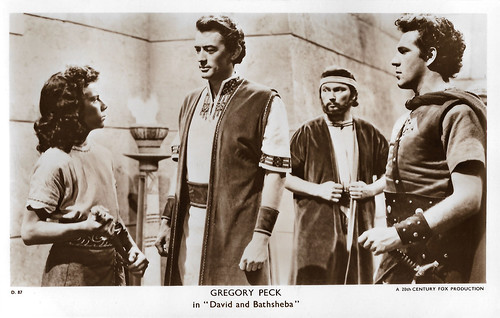
British postcard by The Picturegoer Series, London, no. D 87. Photo: 20th Century Fox. Publicity still for David and Bathsheba (Henry King, 1951) with Gregory Peck and Kieron Moore.
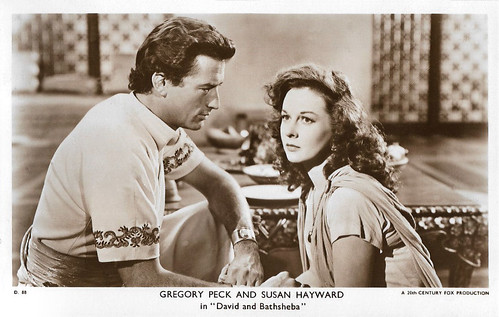
British postcard by The Picturegoer Series, London, no. D 88. Photo: 20th Century Fox. Publicity still for David and Bathsheba (Henry King, 1951) with Gregory Peck and Susan Hayward.
David and Bathsheba (Henry King, 1951) was loosely based on the life of David (Gregory Peck), the second King of Israel, who ruled Israel for approximately forty years (c. 1000 B.C. to 960 B.C.). It tells a very intimate story of David's fall from grace and how he tries to find it again.
The youth of David is told in flashback; how he was chosen by a Prophet of Yahweh to be King of Israel, and earns his way to be second to the king, Saul, by defeating Goliath the Philistine in battle when all else are afraid to beard the giant warrior. Goliath of Gath was portrayed by 203 cm-tall Lithuanian wrestler Walter Talun.
Thereafter, David finally is driven from the court of King Saul of Israel (Francis X. Bushman), becomes a famous warrior, and returns to claim the kingdom and become the instrument of death of Jonathan, the King's son, formerly a friend.
David's wars are successful - the film opens in fact with a successful attack scene. When the Ark of the Covenant is brought to Jerusalem, a soldier reaches out to steady it and is struck dead. While the prophet Nathan (Raymond Massey) declares this the will of God, a sceptical David pronounces it the result of a combination of heat-stroke and too much wine.
David's life is empty since his wife Michal (Jayne Meadows), is Saul's daughter and is cold to him. He craves for the true love of a woman who loves him as a man instead of as King. He turns to Bathsheba (Susan Hayward), whom he sees from the palace roof bathing naked.
Later Batsheba admits she had hoped he would see her. But she is married to Uriah (Kieron Moore), one of David's most trusted soldiers, and both know an affair would break the law of Moses. When she becomes pregnant, it becomes necessary for Uriah to come in from the battlefield and spend time at home. David's downfall begins when he orders Uriah into a suicidal battle, knowing that this will clear the way for his relationship with Bathsheba. His infatuation leads him to neglect his kingdom and his people, and invokes the wrath of God.
Uriah is killed, a war hero; but this does not solve the infidelity question. Nathan the prophet advises David the people are dissatisfied with his leadership and desire his sons to rule. Nathan tells David he has forgotten that he is a servant of the Lord. Drought comes to Israel, and David's and Bathsheba's baby dies. Nathan returns to tell David that God is displeased with his sin. He will not die as the law demands, but he will be punished through misfortune in his family. David must rediscover his faith in God in order to save Bathsheba from death by stoning, his kingdom from drought and famine, and himself from his many sins.
At last, David places his hands on the Ark of the Covenant, recently brought to Jerusalem and housed in a temple, which has caused the death of others who accidentally came in contact with it, inviting his god to punish him - and nothing happens... David exits the temple, and finds that rain has come to his parched land.
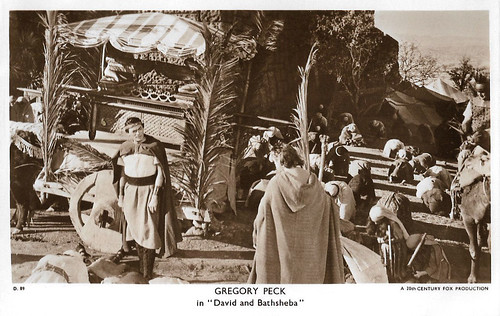
British postcard by The Picturegoer Series, London, no. D 89. Photo: 20th Century Fox. Publicity still for David and Bathsheba (Henry King, 1951) with Gregory Peck.
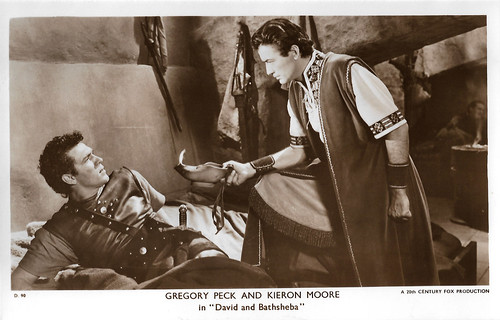
British postcard by The Picturegoer Series, London, no. D 90. Photo: 20th Century Fox. Publicity still for David and Bathsheba (Henry King, 1951) with Gregory Peck and Kieron Moore.
David and Bathsheba (1951) was produced out of 20th Century Fox by Darryl F. Zanuck, and directed by veteran Henry King. The film is based around the second Old Testament book of Samuel from the Bible.
Seeing the success of Cecil B. DeMille's Samson and Delilah (1949), Zanuck had commissioned Philip Dunne to write a script based on King David. Phillip Dunne's Oscar nominated screenplay holds the attention throughout. His script is with much meditation and discussion, interspersed with bursts of word-for-word biblical dramatisations. This makes the film sometimes a bit talkative.
Typically for the genre, David and Bathsheba is a large, grandiose production. From its excellent set designs and art direction by Thomas Little, Lyle Weeler, and George Davis, along Alfred Newman's beautiful music score to the gorgeous Technicolor photography by Leon Shamroy.
The fine cast includes next to the mentioned actors, James Robertson Justice, Raymond Massey and John Sutton plus a dance by a young Gwen Verdon, the future musical theatre star .
David and Bathsheba has all the size and grandeur of many of the great biblical epics of the 1950s and 1960s, but it is the first that humanises the biblical characters themselves. The film earned an estimated $7 million at the US box office in 1951, making it the most popular film of the year.
The power of the film rests in Gregory Peck's intense, hypnotising performance as David. Toward the end, having hit rock bottom, he must answer for his life. These last 15 minutes of the film are great and the handsome Peck is an absolute joy to watch.
Craig Butler at AllMovie: "Fans of Biblical epics will find a lot to like in David and Bathsheba; although there's little here that will appeal to those who don't look favorably upon the genre. The script is predictably overblown, filled with the kind of bombast and stilted melodrama that is to be expected. It's ridiculous, yet in its own strange way, it works."

British postcard by The Picturegoer Series, London, no. D 91. Photo: 20th Century Fox. Publicity still for David and Bathsheba (Henry King, 1951) with Gregory Peck and Raymond Massey.
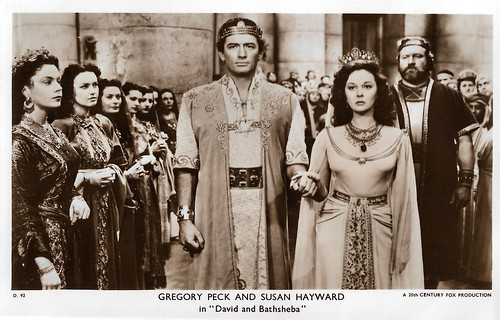
British postcard by The Picturegoer Series, London, no. D 92. Photo: 20th Century Fox. Publicity still for David and Bathsheba (Henry King, 1951) with Gregory Peck and Susan Hayward.
Source: Craig Butler (AllMovie), Hal Erickson (AllMovie), American Film Institute, Wikipedia and IMDb.

British postcard by The Picturegoer Series, London, no. D 87. Photo: 20th Century Fox. Publicity still for David and Bathsheba (Henry King, 1951) with Gregory Peck and Kieron Moore.

British postcard by The Picturegoer Series, London, no. D 88. Photo: 20th Century Fox. Publicity still for David and Bathsheba (Henry King, 1951) with Gregory Peck and Susan Hayward.
The infidelity question
David and Bathsheba (Henry King, 1951) was loosely based on the life of David (Gregory Peck), the second King of Israel, who ruled Israel for approximately forty years (c. 1000 B.C. to 960 B.C.). It tells a very intimate story of David's fall from grace and how he tries to find it again.
The youth of David is told in flashback; how he was chosen by a Prophet of Yahweh to be King of Israel, and earns his way to be second to the king, Saul, by defeating Goliath the Philistine in battle when all else are afraid to beard the giant warrior. Goliath of Gath was portrayed by 203 cm-tall Lithuanian wrestler Walter Talun.
Thereafter, David finally is driven from the court of King Saul of Israel (Francis X. Bushman), becomes a famous warrior, and returns to claim the kingdom and become the instrument of death of Jonathan, the King's son, formerly a friend.
David's wars are successful - the film opens in fact with a successful attack scene. When the Ark of the Covenant is brought to Jerusalem, a soldier reaches out to steady it and is struck dead. While the prophet Nathan (Raymond Massey) declares this the will of God, a sceptical David pronounces it the result of a combination of heat-stroke and too much wine.
David's life is empty since his wife Michal (Jayne Meadows), is Saul's daughter and is cold to him. He craves for the true love of a woman who loves him as a man instead of as King. He turns to Bathsheba (Susan Hayward), whom he sees from the palace roof bathing naked.
Later Batsheba admits she had hoped he would see her. But she is married to Uriah (Kieron Moore), one of David's most trusted soldiers, and both know an affair would break the law of Moses. When she becomes pregnant, it becomes necessary for Uriah to come in from the battlefield and spend time at home. David's downfall begins when he orders Uriah into a suicidal battle, knowing that this will clear the way for his relationship with Bathsheba. His infatuation leads him to neglect his kingdom and his people, and invokes the wrath of God.
Uriah is killed, a war hero; but this does not solve the infidelity question. Nathan the prophet advises David the people are dissatisfied with his leadership and desire his sons to rule. Nathan tells David he has forgotten that he is a servant of the Lord. Drought comes to Israel, and David's and Bathsheba's baby dies. Nathan returns to tell David that God is displeased with his sin. He will not die as the law demands, but he will be punished through misfortune in his family. David must rediscover his faith in God in order to save Bathsheba from death by stoning, his kingdom from drought and famine, and himself from his many sins.
At last, David places his hands on the Ark of the Covenant, recently brought to Jerusalem and housed in a temple, which has caused the death of others who accidentally came in contact with it, inviting his god to punish him - and nothing happens... David exits the temple, and finds that rain has come to his parched land.

British postcard by The Picturegoer Series, London, no. D 89. Photo: 20th Century Fox. Publicity still for David and Bathsheba (Henry King, 1951) with Gregory Peck.

British postcard by The Picturegoer Series, London, no. D 90. Photo: 20th Century Fox. Publicity still for David and Bathsheba (Henry King, 1951) with Gregory Peck and Kieron Moore.
Intense, hypnotising performance
David and Bathsheba (1951) was produced out of 20th Century Fox by Darryl F. Zanuck, and directed by veteran Henry King. The film is based around the second Old Testament book of Samuel from the Bible.
Seeing the success of Cecil B. DeMille's Samson and Delilah (1949), Zanuck had commissioned Philip Dunne to write a script based on King David. Phillip Dunne's Oscar nominated screenplay holds the attention throughout. His script is with much meditation and discussion, interspersed with bursts of word-for-word biblical dramatisations. This makes the film sometimes a bit talkative.
Typically for the genre, David and Bathsheba is a large, grandiose production. From its excellent set designs and art direction by Thomas Little, Lyle Weeler, and George Davis, along Alfred Newman's beautiful music score to the gorgeous Technicolor photography by Leon Shamroy.
The fine cast includes next to the mentioned actors, James Robertson Justice, Raymond Massey and John Sutton plus a dance by a young Gwen Verdon, the future musical theatre star .
David and Bathsheba has all the size and grandeur of many of the great biblical epics of the 1950s and 1960s, but it is the first that humanises the biblical characters themselves. The film earned an estimated $7 million at the US box office in 1951, making it the most popular film of the year.
The power of the film rests in Gregory Peck's intense, hypnotising performance as David. Toward the end, having hit rock bottom, he must answer for his life. These last 15 minutes of the film are great and the handsome Peck is an absolute joy to watch.
Craig Butler at AllMovie: "Fans of Biblical epics will find a lot to like in David and Bathsheba; although there's little here that will appeal to those who don't look favorably upon the genre. The script is predictably overblown, filled with the kind of bombast and stilted melodrama that is to be expected. It's ridiculous, yet in its own strange way, it works."

British postcard by The Picturegoer Series, London, no. D 91. Photo: 20th Century Fox. Publicity still for David and Bathsheba (Henry King, 1951) with Gregory Peck and Raymond Massey.

British postcard by The Picturegoer Series, London, no. D 92. Photo: 20th Century Fox. Publicity still for David and Bathsheba (Henry King, 1951) with Gregory Peck and Susan Hayward.
Source: Craig Butler (AllMovie), Hal Erickson (AllMovie), American Film Institute, Wikipedia and IMDb.
No comments:
Post a Comment